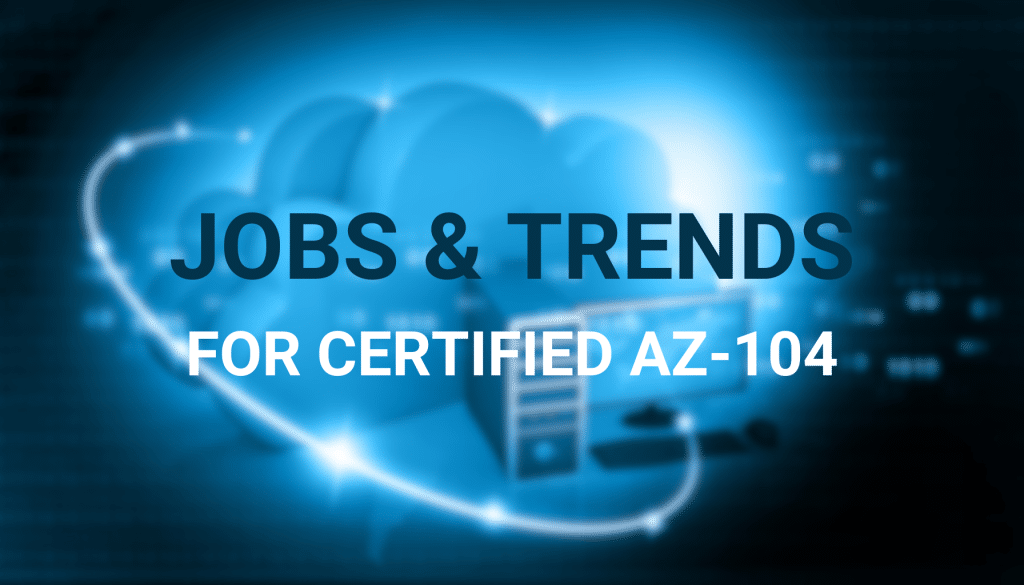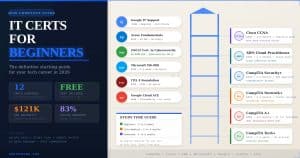Thinking about getting your AZ-104 certification or wondering what it can do for your career in 2026? You’re in the right place! As businesses continue to move to the cloud, the demand for Azure-certified professionals is higher than ever.
Whether you’re just starting out or looking to level up, having an AZ-104 certification can open the door to exciting job roles and impressive salary opportunities.
But what kind of jobs can you expect with this certification? And how much can you really earn? In this guide, we’ll explore the top job roles, salary trends, and what industries are actively looking for Azure-certified experts like you.
If you’re ready to take your cloud career to the next level, keep reading!
Why AZ-104 Certification Is More Valuable Than Ever in 2026
Cloud computing isn’t slowing down anytime soon. More companies are shifting their operations to the cloud, and Microsoft Azure is right up there leading the race. With businesses relying more on Azure services, the need for skilled people who can manage cloud environments is growing fast.
That’s where the AZ-104 cert comes in. It’s not just another piece of paper – it proves you have the right skills to handle Azure setups effectively.
But why is this cert more important now than before? Things are moving quickly in the tech world, and companies want people who can keep up.
Whether it’s managing virtual machines, handling security, or optimizing cloud resources, businesses prefer someone who’s already trained and certified rather than spending months getting new hires up to speed.
If you’re curious about the latest updates, exam format, and changes for this year, check out our detailed AZ-104 certification key stats and exam insights before you start preparing.
Career Opportunities That Await AZ-104 Certified Experts
Having an AZ-104 cert isn’t just about becoming an Azure administrator. Sure, that’s the most obvious role, but it’s far from the only option. In 2026, the cloud job market is expanding, and companies are looking for professionals who can do more than just manage virtual machines. With this cert, doors open to several specialized roles in cloud security, DevOps, and automation areas that are rapidly becoming high-demand.
More Than Just an Azure Admin: What Else Can You Do?
While an Azure Administrator is a solid career path, it’s not the only one available to AZ-104 certified professionals. Organizations are looking for experts who can handle more specific tasks, and the skills gained from this certification apply to a variety of roles, such as:
- Cloud Security Specialist – Security is one of the biggest concerns for businesses using cloud services. With AZ-104, you’re already familiar with managing identities, access controls, and security policies. This makes it easier to move into security-focused roles where you’ll work on protecting cloud environments from threats and ensuring compliance with industry regulations.
- Azure DevOps Engineer – DevOps is becoming the norm for companies looking to speed up their software development cycles. Many organizations prefer cloud admins who understand automation, CI/CD pipelines, and infrastructure as code. If you’re AZ-104 certified, stepping into a DevOps-focused role by learning tools like Azure DevOps, GitHub Actions, or Terraform is a natural next step.
- Cloud Automation Engineer – Automation is key to managing cloud environments efficiently. Companies want professionals who can write scripts, build automated workflows, and reduce manual work. With AZ-104, you already have foundational knowledge of automation tools like Azure PowerShell and ARM templates, setting you up perfectly for automation roles.
How to Make the Most of Your AZ-104 Certification
If you want to explore roles beyond Azure administration, it’s a good idea to build on your certification with additional skills. Some areas to focus on include:
- Learning scripting languages like PowerShell, Python, or Bash to automate tasks and manage cloud resources efficiently.
- Gaining security certifications such as Microsoft Certified: Security, Compliance, and Identity Fundamentals to enhance your cloud security knowledge.
- Exploring DevOps tools such as Kubernetes, Docker, and Terraform to help you step into cloud engineering roles.
- Understanding cloud cost optimization to help businesses reduce their cloud spending, a highly valued skill in today’s economy.
Explore more about Microsoft AZ-104 Certification here.
What This Means for Your Career
Whether you want to stay in an admin role or branch out into security, DevOps, or automation, an AZ-104 certification puts you in a strong position. It proves you have the foundational skills to work with Azure, and with a little extra effort, you can carve out a career path that suits your interests and earns you a competitive salary.
At the end of the day, companies want people who can solve real-world cloud challenges. The AZ-104 certification gives you a great starting point, but it’s up to you to take it further by staying curious and expanding your knowledge. The opportunities are out there you just have to grab them.
The Financial Outlook: What Salaries Can AZ-104 Certified Professionals Expect?
If you’re considering getting your AZ-104 certification, you’re probably wondering how much can I actually earn with it? The good news is that salaries for Azure-certified professionals are on the rise, and 2026 looks even better. With more companies depending on cloud services, certified experts are becoming highly valuable. But the numbers can vary based on several factors like experience, location, and even the kind of industry you work in.
What Are the Salary Trends for AZ-104 Certified Professionals?
Over the past few years, salaries for Azure administrators and cloud engineers have steadily increased. Businesses are investing more in cloud technologies, and they’re willing to pay a premium for the right talent.
As of now, the average salary for an AZ-104 certified professional ranges between $80,000 to $130,000 per year, depending on various factors. In 2026, these numbers are expected to increase by 10-15% as demand keeps growing and the job market tightens.
Here’s a breakdown of potential salary ranges based on roles related to AZ-104 certification:
- Azure Administrator – $80,000 to $110,000
- Cloud Engineer – $95,000 to $130,000
- Azure Security Administrator – $100,000 to $140,000
- Cloud Consultant – $85,000 to $120,000
- DevOps Engineer (with Azure skills) – $110,000 to $150,000
Some professionals who specialize further or move into senior roles could even earn upwards of $150,000, especially in high-demand industries such as finance, healthcare, and tech.
Experience and Location: How They Affect Earnings
Not all AZ-104 professionals earn the same. Experience plays a big role in determining salary.
- Entry-Level (0-2 years): Expect to start around $65,000 to $85,000, which can quickly rise with hands-on experience and additional certifications.
- Mid-Level (3-5 years): With a solid background and problem-solving skills, professionals in this range typically earn $90,000 to $120,000.
- Senior-Level (6+ years): Experienced Azure pros with deep knowledge of networking, automation, and security can earn $125,000+, especially in large enterprises.
Geography is another big factor. If you’re working in high-cost areas like the United States (California, New York, Texas), Canada, the UK, or Australia, salaries tend to be on the higher end. Tech hubs such as Silicon Valley, London, and Sydney offer better pay compared to smaller cities or rural areas.
On the other hand, remote work has changed the game. Many companies are now open to hiring certified professionals from anywhere, which means even those in lower-cost regions can negotiate competitive salaries.
How Does AZ-104 Compare to Other Cloud Certifications?
If you’re looking at cloud certifications and wondering whether AZ-104 offers good financial value compared to AWS or Google Cloud certs, here’s how they stack up:
- AZ-104 (Azure Administrator Associate): $80,000 – $130,000
- AWS Certified Solutions Architect – Associate: $90,000 – $140,000
- Google Associate Cloud Engineer: $85,000 – $125,000
While AWS certs tend to offer slightly higher pay in some regions, Microsoft Azure is rapidly catching up due to its strong presence in enterprise environments. In industries such as government, healthcare, and finance, Azure is often the preferred cloud platform, giving AZ-104 professionals an edge.
One major advantage of AZ-104 is that Microsoft services are deeply integrated with existing enterprise tools like Office 365, Dynamics 365, and Active Directory, making it easier for organizations to transition their IT infrastructure to Azure. This means more long-term job security and potential salary growth.
How to Maximize Your Earning Potential with AZ-104
If you want to boost your salary further, consider the following strategies:
- Add More Certifications: Once you have AZ-104, look at pursuing certs like AZ-305 (Azure Solutions Architect Expert) or AZ-400 (DevOps Engineer Expert) to increase your value.
- Specialize in High-Demand Areas: Skills in security, automation, and AI integration with Azure can set you apart and help command higher pay.
- Gain Practical Experience: Certifications alone won’t cut it; hands-on experience in real-world scenarios is key to unlocking higher salaries.
- Negotiate with Confidence: Many professionals settle for less than they’re worth. Do your research, know your value, and don’t hesitate to negotiate offers.
- Stay Updated: The cloud world is constantly changing, so staying ahead with the latest Azure updates can make you more desirable to employers.

High-Paying Industries Looking for AZ-104 Certified Talent
Getting AZ-104 certified is a smart move, but knowing which industries offer the best pay can help you focus your job search and career growth. Not all sectors pay the same, and some industries are investing heavily in cloud technology, making them more eager to hire skilled Azure professionals. Whether you’re looking for a stable job, better salary, or exciting work environments, certain industries stand out for their demand and financial rewards.
Which Industries Pay the Most for AZ-104 Professionals?
While Azure is being used across almost every industry, some sectors are leading the demand and offering higher salaries to certified talent. The most competitive packages can be found in:
- Finance and Banking
- Healthcare and Pharmaceuticals
- Technology and IT Services
- Government and Public Sector
- Retail and E-commerce
Let’s take a deeper look at why these industries are on the lookout for AZ-104 certified pros and what they offer.
Finance and Banking: Big Money, Bigger Cloud Investments
Banks and financial institutions are all-in on cloud computing. With millions of customers, huge transaction volumes, and strict regulations, they need cloud environments that are secure, scalable, and always available. Microsoft Azure offers a range of tools to help them achieve this, and certified professionals who can manage these systems are in high demand.
Why Finance Needs AZ-104 Certified Experts:
- Moving legacy systems to the cloud without downtime.
- Implementing strict security policies and compliance standards (GDPR, PCI-DSS, etc.).
- Optimizing cloud infrastructure to reduce operational costs.
Salary Range:
- Cloud admins in finance can earn anywhere between $90,000 to $140,000, depending on experience and responsibilities.
Healthcare and Pharmaceuticals: Security and Compliance Drive Demand
Healthcare organizations are handling sensitive patient data, making security and compliance top priorities. Cloud services like Azure provide solutions to store, process, and analyze data securely, and companies need certified professionals who can ensure compliance with regulations like HIPAA.
Why Healthcare Is Hiring AZ-104 Certified Talent:
- Managing secure cloud-based patient record systems.
- Ensuring disaster recovery and business continuity.
- Implementing AI-driven healthcare solutions with cloud integration.
Salary Range:
- Azure professionals in healthcare typically earn between $85,000 to $130,000, with higher pay for those handling complex security and compliance needs.
Technology and IT Services: Endless Opportunities and Growth
Tech companies and IT service providers are some of the biggest employers of Azure-certified talent. From startups to large enterprises, they rely on cloud solutions to deliver software, host applications, and run their entire infrastructure. The rapid adoption of cloud-native applications has made the need for skilled Azure admins even more critical.
Why Tech Companies Want AZ-104 Pros:
- Managing large-scale cloud environments for SaaS and PaaS solutions.
- Deploying and maintaining virtual networks, databases, and storage solutions.
- Providing cost optimization strategies for cloud services.
Salary Range:
- Salaries in the tech sector can range from $95,000 to $150,000, with additional perks like remote work and performance bonuses.
Government and Public Sector: Stability and Long-Term Projects
Government agencies are transitioning their operations to the cloud to improve efficiency and cut costs. Azure provides tools that meet government compliance standards, making it a popular choice for public sector projects. Certified professionals are needed to manage cloud infrastructure, ensure data security, and maintain operational continuity.
Why Government Organizations Need Azure Experts:
- Handling sensitive government data with Azure’s security features.
- Managing large-scale infrastructure across multiple departments.
- Ensuring compliance with national and international regulations.
Salary Range:
- Government cloud admins can expect to earn $80,000 to $120,000, with benefits such as job stability and pension plans.
Retail and E-commerce: The Demand for Scalable Solutions
Retailers and e-commerce businesses need scalable cloud solutions to handle fluctuating traffic, especially during peak seasons like Black Friday. Azure helps them optimize their operations by providing seamless integration with their inventory, customer data, and analytics platforms.
Why Retailers Are Investing in Azure Talent:
- Managing cloud solutions for high-traffic e-commerce websites.
- Ensuring quick scaling during seasonal demand.
- Implementing AI-driven analytics and personalization tools.
Salary Range:
- Salaries in the retail sector range from $85,000 to $125,000, with potential bonuses for optimizing cloud performance and cost savings.
How to Get into These High-Paying Industries
If you’re AZ-104 certified and aiming to get into one of these industries, here are a few tips to increase your chances:
- Focus on Industry-Specific Knowledge: Understand the compliance needs and cloud requirements unique to each sector. For example, knowing HIPAA for healthcare or PCI-DSS for finance can set you apart.
- Gain Hands-on Experience: Work on real-world projects related to the industry you’re targeting, whether it’s through freelancing or cloud labs.
- Network with Industry Professionals: Attend Azure and cloud computing events to connect with hiring managers from your desired industry.
- Get Specialized Certifications: Consider adding related certs like Azure Security Engineer (AZ-500) or Azure Solutions Architect (AZ-305) to increase your earning potential and attractiveness to employers.
Key Skills That Can Maximize Your Earning Potential
Earning your AZ-104 cert is a great start, but if you really want to land high-paying roles, you’ll need more than just the basics. Employers are looking for cloud pros who can go beyond managing Azure resources—they want people who can automate, optimize, and align cloud operations with business goals. The right mix of technical and soft skills can make all the difference when it comes to commanding a better salary and standing out from the competition.
Beyond Certification: What Skills Do Employers Really Value?
While having an AZ-104 certification proves your knowledge of Azure administration, companies want more than just a certified professional. They’re willing to pay a premium for candidates who bring additional skills to the table, such as:
- Cloud Automation: Employers prefer candidates who can automate cloud operations to save time and reduce human errors.
- Security Knowledge: With data breaches on the rise, cloud security expertise is becoming a must-have skill.
- Infrastructure Cost Optimization: Businesses want professionals who can efficiently manage resources and reduce cloud spending.
- Hybrid Cloud Management: As more companies adopt hybrid setups, knowledge of on-prem and multi-cloud integration is a valuable asset.
Developing these skills alongside your certification can put you ahead of other candidates and open doors to higher-paying roles.
The Power of Automation, Scripting, and Infrastructure as Code (IaC)
One of the biggest game-changers in cloud management is automation. Companies no longer want manual processes; they want to automate deployments, configurations, and maintenance tasks. That’s why cloud professionals with automation skills are in high demand.
Skills that Matter in Automation:
- PowerShell and Azure CLI: These are essential tools for automating tasks such as provisioning resources, managing security groups, and scaling workloads. Mastering them can make your work more efficient and scalable.
- Terraform and ARM Templates: Infrastructure as Code (IaC) is a hot skill right now. Tools like Terraform help manage cloud infrastructure using code, making deployments faster and repeatable.
- CI/CD Pipelines: Working with Azure DevOps, GitHub Actions, or Jenkins to automate deployment workflows is a valuable skill that employers love.
If you’re comfortable with automation and IaC, you can take on more advanced roles, such as Cloud Engineer or DevOps Specialist, which often come with higher salaries and more responsibilities.
Cloud Security: A Skill That Pays Off
With the increasing reliance on cloud solutions, security has become a top priority for businesses. Employers need Azure pros who understand how to secure cloud environments and follow best practices for identity and access management.
Key Security Skills Employers Look For:
- Azure Security Center & Defender: Monitoring and protecting cloud workloads using built-in security solutions.
- Identity and Access Management (IAM): Managing user roles, permissions, and implementing conditional access policies.
- Networking Security: Understanding firewall rules, VPN configurations, and secure data transfers across cloud and on-prem environments.
By focusing on cloud security skills, you can position yourself for specialized roles such as Azure Security Engineer, which typically offer higher pay due to the critical nature of the job.
Soft Skills That Can Boost Your Value
It’s not just about technical skills. Employers are also looking for professionals who can work well with teams, solve complex problems, and communicate ideas effectively. The right soft skills can set you apart and increase your earning potential.
Key Soft Skills to Focus On:
- Communication Skills: Whether it’s explaining a cloud strategy to non-technical stakeholders or collaborating with DevOps teams, clear communication is essential.
- Problem-Solving Abilities: Cloud environments can be unpredictable. Employers value professionals who can think on their feet and troubleshoot issues quickly.
- Adaptability: Azure is constantly evolving, and staying updated with new tools and features can make you a valuable asset to any organization.
Developing strong soft skills can help you move into leadership roles like Cloud Architect or Cloud Consultant, where salaries are significantly higher than hands-on technical roles.
Combining Skills for Higher Salaries
If you really want to maximize your earning potential, combining different skills is key. For example:
- AZ-104 + DevOps (CI/CD, Terraform, Kubernetes) → Paves the way for higher-paying DevOps Engineer roles.
- AZ-104 + Security (Azure Defender, Compliance Frameworks) → Positions you for specialized security roles with higher paychecks.
- AZ-104 + Business Acumen (Cloud Cost Management, Strategy Planning) → Opens opportunities in cloud consultancy and senior management.
By expanding your skill set and aligning it with market needs, you can ensure you’re not just another certified professional but a highly sought-after cloud expert.
How to Build These Skills Without Breaking the Bank
You don’t need to spend a fortune on additional courses to improve your skills. There are many free or low-cost ways to keep learning and growing, such as:
- Microsoft Learn: Offers free learning paths for Azure-related topics, from automation to security.
- Hands-on Practice: Set up your own Azure lab environment to test scripts and deployments in real-time.
- Online Communities: Engage with Azure forums, LinkedIn groups, and tech meetups to learn from experienced professionals.
- Certifications Add-ons: Consider earning certifications like AZ-500 (Security) or AZ-400 (DevOps) to deepen your expertise and demand higher pay.
Future-Proofing Your Career: What’s Next After AZ-104?
Earning your AZ-104 certification is a great step, but it’s just the beginning. Technology is always changing, and the cloud world is no exception. If you want to stay ahead, you need to think beyond just Azure administration. The demand for cloud professionals is growing, but so is the competition. Companies are looking for people who can do more than manage cloud resources, they want experts who can optimize, secure, and innovate.
So, where should you go from here? Let’s explore the next steps to keep your career moving forward and your salary growing.
If you’re debating whether to stay on the admin path or pivot toward development, our AZ-104 vs AZ-204 comparison breaks down the differences to help you pick the right next step.
Leveling Up with Advanced Azure Certifications
Once you’ve mastered the fundamentals with AZ-104, the logical next step is to go for higher-level certifications that expand your skill set and open doors to better opportunities. Microsoft offers several certs that can help you specialize and stand out:
- AZ-305: Azure Solutions Architect Expert
- This cert takes your cloud knowledge to the next level, focusing on designing cloud solutions instead of just managing them.
- You’ll learn how to handle complex deployments, security requirements, and cost optimization strategies.
- Solution architects are among the highest-paid roles in cloud computing, with salaries often exceeding $130,000 to $160,000.
- AZ-400: Azure DevOps Engineer Expert
- If automation and streamlining cloud operations interest you, this cert is a great choice.
- It covers CI/CD pipelines, infrastructure as code (IaC), and monitoring, helping you transition into DevOps roles.
- DevOps engineers with Azure expertise can earn anywhere between $110,000 to $150,000 annually.
- AZ-500: Microsoft Azure Security Engineer
- Security is a top priority for every organization, and cloud security specialists are in huge demand.
- This cert focuses on identity management, threat protection, and securing workloads.
- Salaries for cloud security experts typically range from $100,000 to $140,000.
Choosing one of these paths after AZ-104 will not only boost your earning potential but also make you a more attractive candidate for leadership and specialized roles.
Exploring Hybrid Roles That Combine Azure with AI, Data Science, and Cybersecurity
Cloud computing isn’t an isolated field anymore. Companies want professionals who can work across different technologies and add more value to their operations. As an AZ-104 certified pro, you can explore hybrid roles that bring together Azure with emerging fields like AI, data science, and cybersecurity.
- Azure + AI/Machine Learning
- With Microsoft investing heavily in AI, professionals who can integrate AI solutions with Azure cloud infrastructure are in high demand.
- Roles such as Cloud AI Engineer or Data Engineer involve deploying AI services, managing big data solutions, and optimizing machine learning models in the cloud.
- Earning certifications like AI-102 (Azure AI Engineer) can help you pivot into these roles.
- Azure + Data Science
- If working with data excites you, expanding your Azure skills to include data platforms and analytics is a smart move.
- Roles such as Azure Data Engineer or Cloud Data Analyst focus on handling large datasets, building data pipelines, and ensuring data availability for business insights.
- Certifications like DP-203 (Azure Data Engineer Associate) can be your next step.
- Azure + Cybersecurity
- Cyber threats are increasing, and companies need professionals who can secure their cloud environments while staying compliant with regulations.
- Hybrid roles like Cloud Security Analyst or Compliance Specialist blend Azure infrastructure management with a focus on threat detection and compliance enforcement.
- Consider pursuing SC-300 (Identity and Access Administrator) or other security-related certifications.
By combining your AZ-104 skills with these additional domains, you can future-proof your career and stay ahead of the competition.
Want to maximize your chances of passing on your first try? Don’t miss our AZ-104 exam proven tips and study resources to fine-tune your preparation and tackle the test with confidence.
Why Continuous Learning is Key to Long-Term Financial Success
The cloud industry is always changing. New tools, best practices, and trends emerge every year. If you want to stay relevant and keep your earning potential high, you have to commit to continuous learning.
How to Stay Ahead:
- Stay Updated with Azure Services: Microsoft constantly rolls out updates and new features. Keeping track of these changes through Microsoft Learn, blogs, and webinars can help you stay relevant.
- Join Cloud Communities: Platforms like LinkedIn, Microsoft Tech Community, and GitHub allow you to network, share knowledge, and learn from others.
- Hands-on Practice: Setting up your own Azure lab environment to experiment with new services and scenarios is one of the best ways to keep your skills sharp.
- Attend Conferences and Webinars: Events like Microsoft Ignite and Azure Bootcamps are great places to learn about the latest trends and network with industry leaders.
- Cross-Skill with Other Cloud Providers: Expanding your knowledge beyond Azure to platforms like AWS and Google Cloud can increase your job opportunities and salary potential.
Continuous learning isn’t just about getting more certs, it’s about staying adaptable and being ready for the next wave of cloud innovation.
The Road Ahead: Your Career Beyond AZ-104
Your AZ-104 certification is a great stepping stone, but the journey doesn’t stop there. Whether you decide to specialize in solution architecture, security, automation, or even branch into AI and data, the cloud world offers endless growth opportunities.
You can secure a successful and financially rewarding future in cloud computing by continuously expanding your skills and adapting to industry trends.
So, what’s next for you? It’s time to plan your next move and take your cloud career to the next level! Get the best exam dumps from Cert Empire to kickstart your preparation. Get the best AZ-104 exam dumps from Cert Empire and take the next step in your cloud career with a solid foundation.
Want to maximize your chances of passing on your first try? Check out these proven AZ-104 exam tips and study resources to fine-tune your preparation and tackle the test with confidence.
FAQs
What is the average starting salary for an AZ-104 certified professional?
Entry-level professionals can expect to earn between $65,000 to $85,000 annually, depending on location and industry. Salaries increase with experience and additional certifications.
Is it possible to land a job with AZ-104 certification alone?
Yes, but practical experience is crucial. Employers prefer candidates who can demonstrate hands-on Azure skills through projects or internships.
How does AZ-104 compare with AWS and Google Cloud certifications in terms of pay?
AZ-104 offers competitive salaries, typically ranging from $80,000 to $130,000, slightly lower than AWS but on par with Google Cloud in enterprise environments.
Are there part-time or contract-based roles available for AZ-104 professionals?
Yes, many businesses offer freelance, part-time, and contract roles, especially for cloud migrations, system monitoring, and cost optimization projects.
What are the best resources to stay updated on Azure trends?
Follow Microsoft Learn, Azure blogs, LinkedIn groups, and online forums like Reddit and the Microsoft Tech Community for the latest updates and best practices.


























